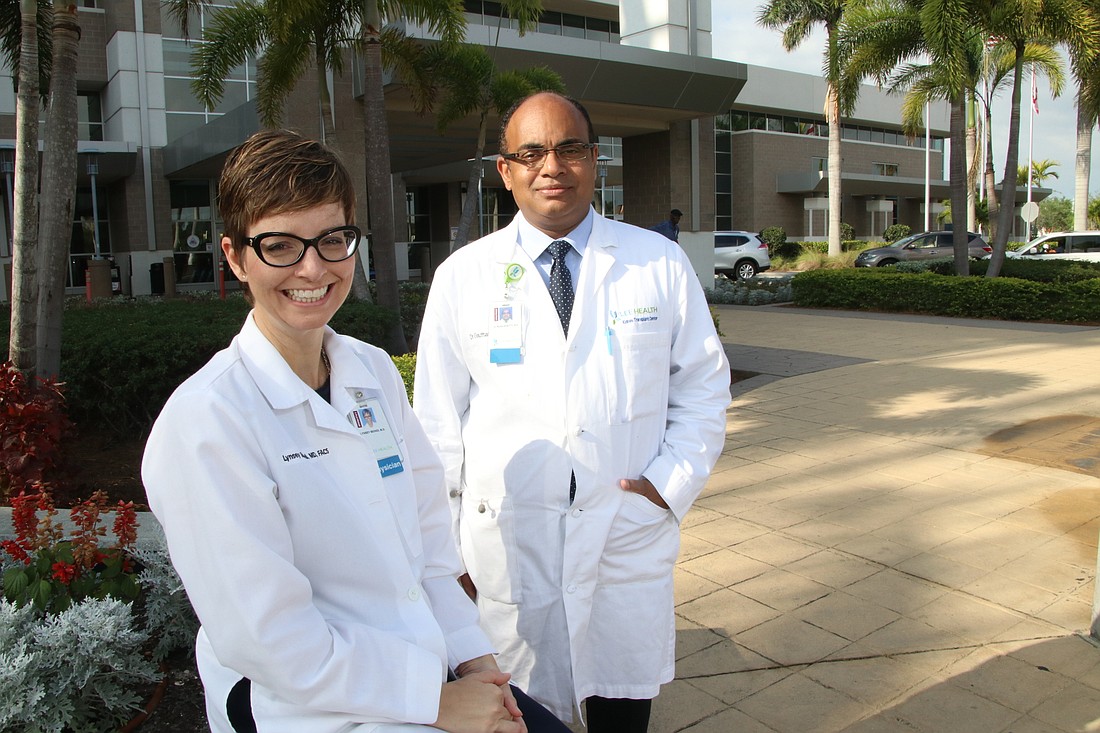A year of success for Lee Health’s revived kidney transplant program gives promise that a region known for quality of life will keep a key contributor to continuation of life.
Whether that would happen was not a sure thing three years ago. That’s when a kidney donor died at Gulf Coast Medical Center during surgery overseen by private-practice kidney specialists. Resurrecting the program after a forced hiatus for 2016 hinged on nonprofit Lee Health’s willingness to take control of a program that accounted for about 900 transplants since 1990.
The Lee Health takeover, mandated by the United Network for Organ Sharing, regulator of U.S. transplant programs, led Lee Health to hire a team of fellowship-trained transplant surgeons and nephrologists. Dr. Lynsey Biondi, program director, and Dr. Gautham Mogilishetty, medical director, lead the team.
A year and two-dozen transplants later, Lee Health executives and policymakers are pleased they withstood any temptation to let the unprofitable program stay dormant. Deciding otherwise would have forced patients with final-stage renal disease to leave the region for treatment, they note.
“Completely restructuring the transplant program was a major undertaking in both resources and time,” says Dr. Larry Antonucci, Lee Health president and CEO. “We are pleased the community is already benefiting from the investments. Twenty-four people are now living with new kidneys and better quality of life.”
Lee Health spent $3.6 million for the program overhaul and projects annual costs of $2.4 million, including salaries, says Biondi. She was recruited to the newly named Kidney Transplant Institute at Gulf Coast Medical Center from Lehigh Valley Health Network in Pennsylvania, where she oversaw pancreas transplantations.
‘We also brought the best of transplant learning in the world to Southwest Florida.’ Dr. Lynsey Biondi
Though Biondi was uninvolved in the past program, there are lessons learned there they utilize going forward. For one, because the man who died on the operating table in 2015 was an overweight diabetic and thus a high-risk donor, a chief mandate of the United Network for Organ Sharing specified more discernment in selecting donors.
“We also brought the best of transplant learning in the world to Southwest Florida,” adds Biondi, referring to Mogilishetty and fellow team members, transplant nephrologist Dr. Shalini Saith and transplant surgeon Dr. Jacfranz Guiteau.
The team went into year one of the new program with a goal of 10 transplants. It more than doubled that mark — with improved outcomes. “So far, we are at a 100% success rate,” says Biondi says, who notes the survival rate for new transplants is about 96% nationally.
That success gives Biondi and her fellow surgeons confidence they will be ready to resume using kidneys from live donors in the fall. Up until now, the team has taken kidneys from deceased donors. Certification officials, Biondi adds, “have told us we’re good to go.”
The return to live donations, says Biondi, includes hiring an advocate “to speak to the rights of the donor.”
Nationally, 95,000 patients await a kidney transplant, including 4,300 in Florida, says Betsy Edwards, spokeswoman for Tampa-based LifeLink, a nonprofit recovery organization for deceased organ and tissue donations that services Lee and 14 other Florida counties.
Lee Memorial has a waiting list of 103 patients. Based on the national average, the Lee patients will wait 3.6 years for a new kidney. The kidney they get most likely will come from the region or elsewhere in Florida.
To shorten the wait, Gulf Coast Medical Center’s Kidney Transplant Institute will do transplants “day and night,” Biondi says — given available donor and organs.
Even with an increased workload, officials at Lee Health, one of the largest hospital systems statewide, realize the expensive program isn’t likely to be a moneymaker. But the transplantations, Biondi insists, will mean fewer costs for other parts of the hospital and their patients. “Doing a transplant,” she says, “saves hundreds of thousands of dollars” compared with keeping a patient on dialysis.






